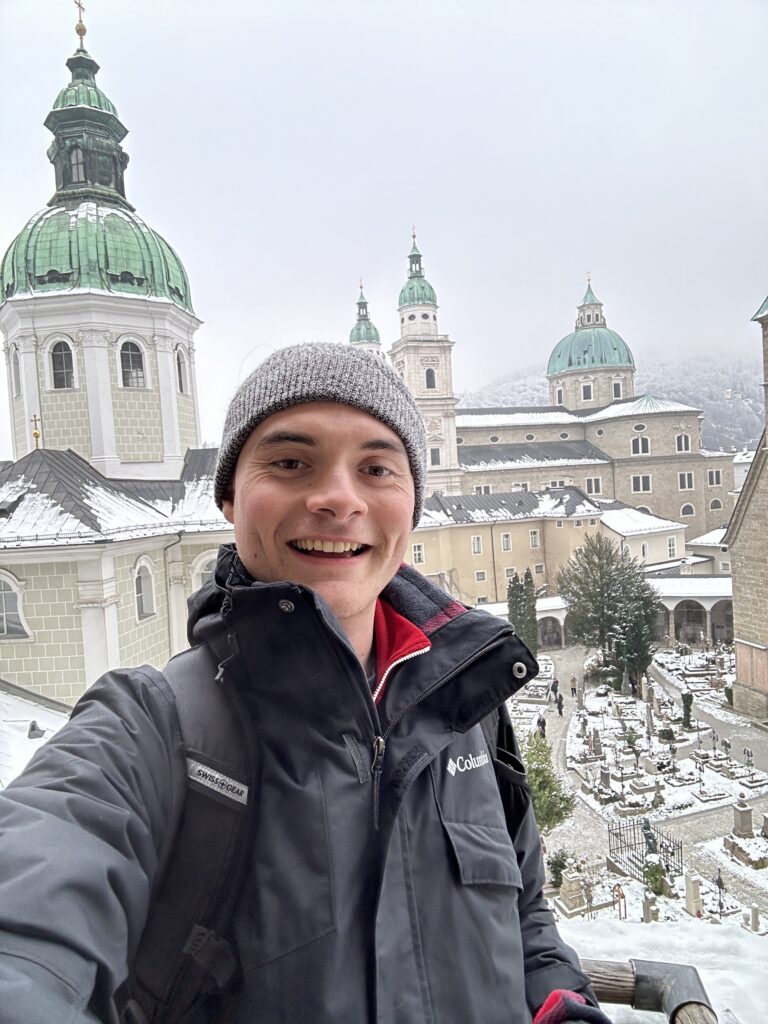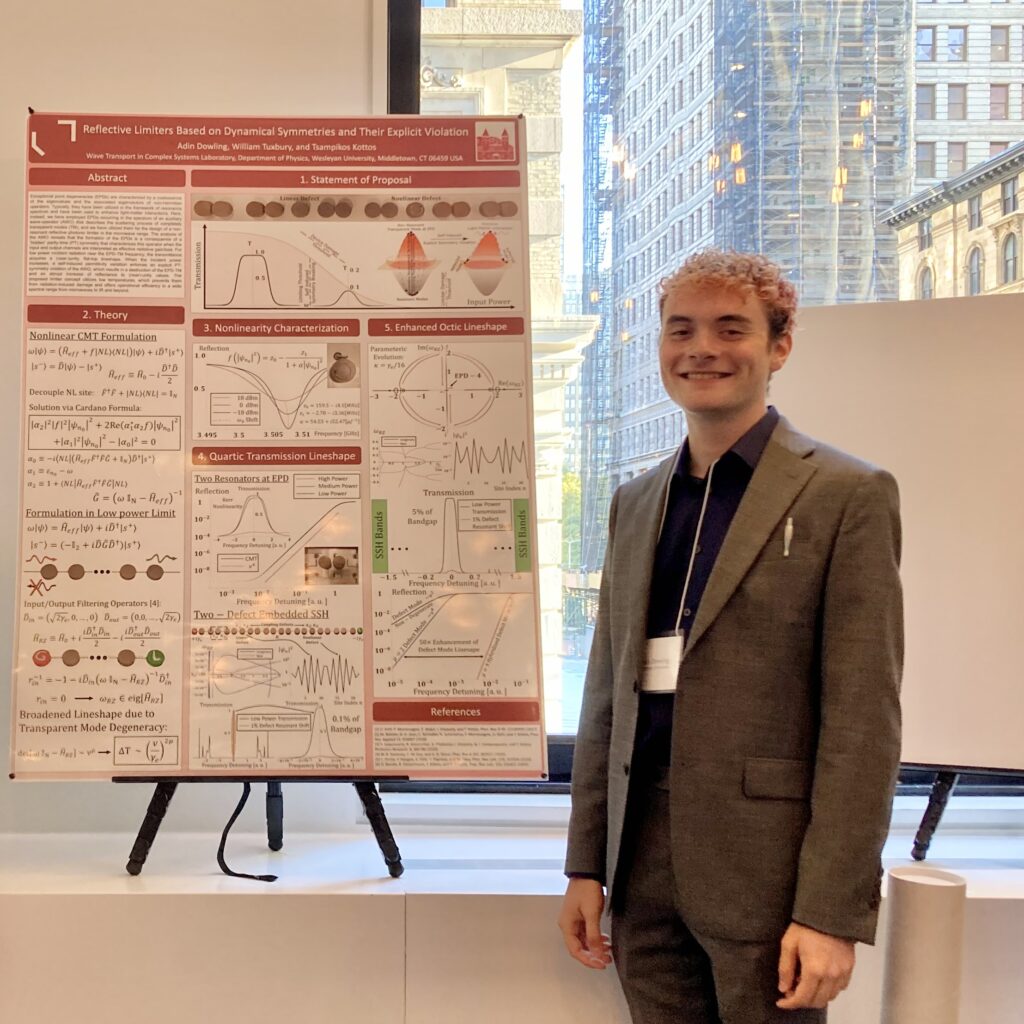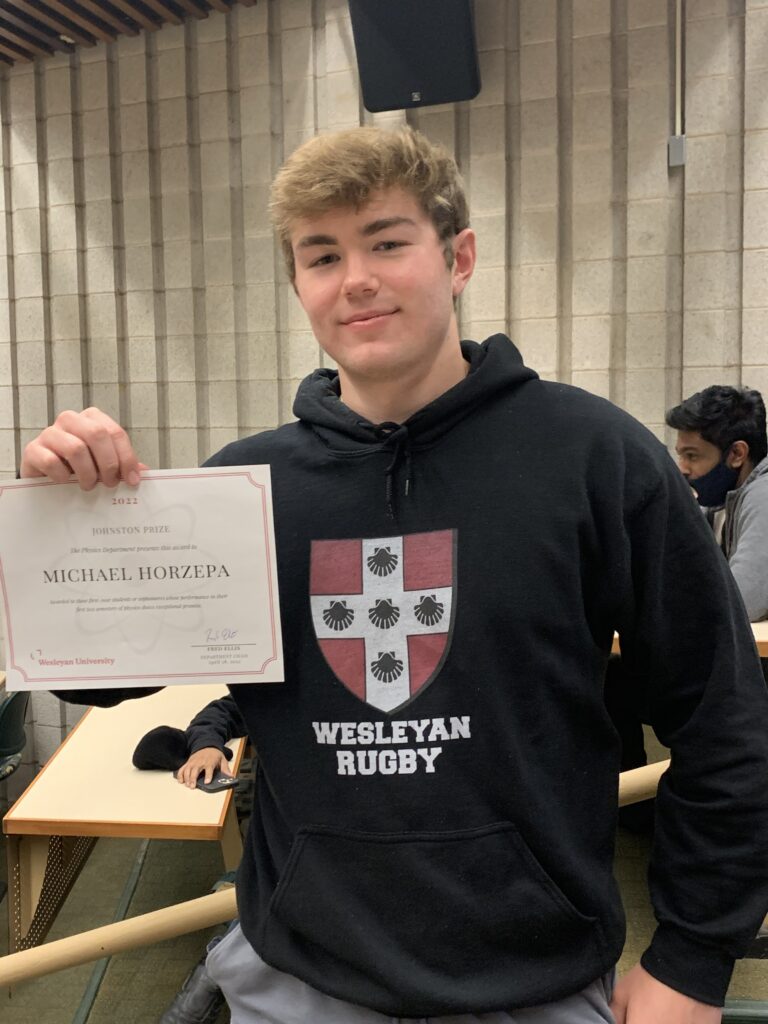by Diana Zhumalieva
During the 2023-2024 academic year, four Wesleyan students were nominated for the were nominated for the prestigious Barry Goldwater Scholarship, which supports college sophomores and juniors planning research careers in the natural sciences, mathematics and engineering.
Before the results were in, in Spring 2024, Diana Zhumalieva ‘24, Fellowships Assistant, talked with Adin Dowling ‘25 and Michael Horzepa ‘25 about their academic passions, experience at Wesleyan, and the application process for the Goldwater Scholarship. Read below an edited transcript of the conversation to learn more about the Goldwater Scholarship application process and hear directly from some of Wesleyan’s nominees.
Wesleyan rising sophomores and juniors can express interest in being nominated for this opportunity by writing to fellowships@wesleyan.edu or, starting the second Tuesday in September, by filling out the online pre-application on the Goldwater Scholarship website.


Could you introduce yourself?
A: I’m Adin (he/him), junior. I major in math, physics and College of Integrative Sciences. I do physics research in the lab and TA physics.
M: I’m Mike (he/him). I’m a junior, math, physics, and computer science major. I do math research and play rugby.
How did you hear about the Goldwater scholarship and what made you want to apply?
A: Yeah, my professor put it on my horizon. I’ve been doing research since the second semester of freshman year, so I had a body of work by then. I felt like why not give it a shot and see what happens?
M: I got emails about it from Erica. We received mass emails through the physics and math departments. And I thought, why not? I really started my research last spring going into the summer. And I know that in math research, it’s kind of hard to get into it because there’s a high barrier to entry. And so once I started doing that, I saw this opportunity, and figured I might as well throw my hat in and see what happens.
What is your research focus?
A: I work in Dr. Kottos’ wave transport in a complex systems lab. Waves come in all shapes and sizes: water, sound, light, electricity, and vibration; the best part is, wave theory applies to all waves! What we are studying is the theory and equations governing how waves propagate and interact with matter. This is an ever more prevalent topic in our increasingly technical age and has applications ranging from fiber optics, bluetooth, and cellular communications to data storage, device protection, and power enhancement. Specifically, the overarching theme of my work has been to exploit known wave theory to extract extreme phenomena that were previously thought impossible.

My first project focused on trapping the fastest thing in the universe – light. Here, I built a complex network of microwave cables which formed a tetrahedron. When the lengths of the cables in the tetrahedron obeyed a specific class of rotational symmetry, we were able to trap a specific wavelength of light within a triangular portion of the tetrahedron – this phenomenon is known as a bound state in the continuum. My second project is focused on creating a device (known as a limiter) aimed at protecting against power surges or solar flares (electromagnetic pulses). Here, I have been arranging the structure of dielectric cylinders precisely with a robotic arm. When this structure obeys a specific class of translational symmetry and a nonlinear resonator is added, a self induced broadband limiting phenomenon is observed.

M: The general area of my research is in the study of “continuous” symmetries. Think about the rotations of a circle as a simple example – each rotation preserves the circles, and rotating the circle can be done by smoothly rotating through a given angle. These sorts of continuous symmetries can be identified with hypersurfaces – to once again reference the circle, the rotations can all be identified by an angle which designates a point on the unit circle. In higher dimensions this gets more complicated to study and there are a lot of aspects of them that can be studied. I am specifically studying the geometry of the hypersurfaces of these continuous symmetries. In particular I study how intrinsically “curved” these spaces are. The motivation for this focus, besides being interesting in its own right, lies in the study of the volume of these spaces, which is directly affected by how curved they are. A special family of these symmetries called the indefinite orthogonal groups can be used to study volume in hyperbolic geometry by understanding the volume in the symmetries themselves.
How can the Goldwater Scholarship support your work and what benefits does it offer?
M: I want to go on to get a PhD in mathematics after Wesleyan. And it would be obviously a huge boost to be recognized for this honor. It could help me get into a place that I really would like to go, and I could make the most out of it. And it’s also nice to have the money towards tuition. Seven grand.
A: Especially because Wesleyan just increased tuition by five grand. Yeah. Similarly, I’ve known that I want to go to grad school for ages. And I’m really excited about it, but I feel like even if I don’t get it, it’s a preparatory step for how to do a large scale application, how to compile this kind of research essay under a very strict page limit, which is so difficult. So it’s worthwhile as a learning experience. The person in my lab who just graduated from BA/MA and got into MIT. I would love that, that’s kind of my dream. To do some sort of quantum computing research, we don’t really have quantum computing research here. So this like a pipeline into that for me. But we’ll see.
What does it take to apply to the Goldwater Scholarship?
M: I started research more recently, and so I had to talk to my professor and compile what we’re doing and what the future plans are, because I have a less concrete background in research. And so a lot of it was meeting with him and [discussing] what do we want to do? What is the project? We were already having ideas of where we wanted to go but I think this application helped solidify our plans and [determine] the direction of exactly where I wanted to take the research.
A: I started research in the second semester of freshman year, and I stayed both summers. And I’ve been just accruing [projects] on my computer. I’ve done like a bunch of presentations and posters. So I was compiling and figuring out what narrative I wanted to use for this application. But essentially it’s two components. First, what have you done or want to do in terms of your research? And that’s a three page essay. And then what is your future in terms of science. Do you want to do a PhD? Do you want to teach? At the end of the day, [this] award is for people who want to do PhD.
How long was the whole application process, the timeline?
M & A: October is when you first declare interest. Then you submit your application to Wesleyan in November. If you get nominated by the school in December, you work on it throughout winter break, and submit the National application right as Spring semester starts. We will hear back about the final decisions at the end of March, just a few weeks from now.
Who has helped you, besides your professor, to complete the application process?
M: I got a lot of help from Erica, especially with my first draft of the career planning section. One of my essays was more like a personal statement, and she [helped] me push it forward and really focus on what I want to do, what are my future plans, and how is what I’m doing now going to get me there. And that was really helpful with those essays. She was a good resource.
A: Yeah, Erica was wonderful, super helpful. I also met with all three of my letter recommendation writers to proofread the application. So they knew my work and could write about it if they wanted to. Mainly, it was so many hours on Zoom with my professor.
I had multiple projects that I had worked on. So I wanted to create an arc for the essay, connecting my research to how we’re able to use these tools. And then Erica really helped me with weaving that into the other essays. How is this going to help me in my life? How is this going to help me in my further studies? How is this going to help me in career searching? So the hard part is keeping that thread throughout all of your documents and also keeping room to not only have really intense science language, but also bring it back to Earth and show how it’s helpful in real life and not just in science.
What advice do you have for freshmen and sophomores that are passionate about research in natural sciences?
If you’re an undergrad in math, I would encourage you to really seek out many opportunities to push the math you’re doing. There are directed reading programs that you should try to get into, where you can learn about an advanced topic. There are grad courses, and once you get far enough, those are really, really good.
Michael Horzepa ’25
M: You want to build relationships with professors as early as possible. And with the classes being so small, you really have the chance to just show up in office hours, make your face known to them, make them know your name. Talk with your professors, see if they can give you extra resources. It can be kind of intimidating in math, obviously, just from how hard it is to even engage at the ground floor. So try to engage early and often with every professor, show up at office hours, show up to a math workshop, talk to the PhD students. So that eventually you could engage in research.
A: I think Wesleyan is such a good place for research because it’s so small. You have such personal relationships with professors. I knew no physics when I started my physics lab, but they needed someone to code Python, so I started coding Python, and then started gradually learning things over two years. I would say go for it! If you want to join a lab, just talk to the professor. Nine times out of ten, they will have this random project that they don’t really want to do, and you can do it. But that’s a way in for you, and then you can gradually learn more, especially freshman and sophomore years.
Don’t let imposter syndrome get the better of you, especially in some of these labs where you’re working with the best of the best. If you’re working with them, that means you are the best of the best. If research makes you happy, try and pursue it!
Adin Dowling ’25


